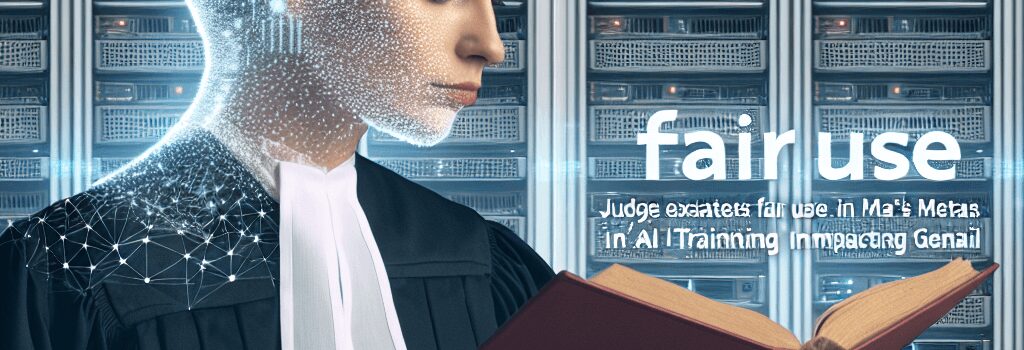Judge Examines Fair Use in Meta’s AI Training Impacting GenAI

At a high-stakes hearing on May 1, 2025, U.S. District Judge Vince Chhabria signaled deep skepticism about Meta’s contention that its large-scale copying of copyrighted books to train its Llama AI models qualifies as “fair use.” The decision, expected later this year, could set a landmark precedent shaping the legal foundations of generative AI (GenAI) across the world.
Background: The Meta v. Authors Copyright Dispute
Meta Platforms Inc. stands accused by a coalition of authors—including Sarah Silverman, Ta-Nehisi Coates and Richard Kadrey—of infringing their copyrights by using torrent networks to obtain and ingest hundreds of thousands of books without licenses. Meta argues that such data mining constitutes a transformative fair use, essential to develop advanced AI that outpaces global rivals.
- Defendant: Meta Platforms, developer of the open-source Llama AI series (Llama 1, 2 and the recently announced Llama 3).
- Plaintiffs: A group of authors alleging unlicensed copying, distribution and market harm.
- Relief sought: Injunctions, statutory damages, and a ruling that large-scale AI training cannot be shielded by fair use.
Key Hearing Moments and Judge’s Stance
During the summary-judgment hearing, Judge Chhabria repeatedly challenged Meta’s lead counsel, Kannon Shanmugam, on how unlicensed ingestion of copyrighted text could be fair use when AI outputs might “flood” existing markets:
- “You have companies using protected material to create an infinite number of competing products,” Chhabria said. “I just don’t understand how that can be fair use.”
- He analogized potential AI output to “a billion pop songs” in a new artist’s style, questioning how up-and-coming creatives could ever compete.
Though Chhabria acknowledged the transformative nature of training generative models, he stressed that transformation alone does not override market-harm considerations under the fourth fair-use factor. The judge pressed the authors’ attorney, David Boies, for concrete evidence of sales loss—an element the plaintiffs must prove to avoid dismissal on fair-use grounds.
Technical Deep Dive: AI Training Pipelines and Data Curation
Meta’s Llama 3, unveiled last month, features up to 70 billion parameters and was trained on an internal corpus of over 3 trillion tokens. The model utilizes Microsoft Azure’s GPU clusters with ZeRO-3 optimizer (from the DeepSpeed library) to shard gradients and reduce memory footprint, enabling efficient scaling across thousands of NVIDIA H100 GPUs.
- Data acquisition: Meta harvested public web crawls, licensed datasets (e.g., Common Crawl) and, controversially, BitTorrent sources—raising questions about provenance controls.
- Preprocessing: Deduplication via MinHash and locality-sensitive hashing (LSH), content filtering to remove hate speech, and tokenization using Byte-Pair Encoding (BPE).
- Training objectives: Next-token prediction (autoregressive) and masked-token objectives in hybrid pretraining phases.
Industry experts like Stanford Law Professor Pamela Samuelson have warned that indiscriminate crawling without robust rights management could undermine authorship incentives. “Large language models pose novel challenges to copyright law, especially when trained on unlicensed text at scale,” she told Tech News.
Global Regulatory Landscape and Implications
Beyond the U.S., regulators are grappling with similar issues. Under the EU AI Act (proposed for enforcement in 2026), providers must maintain a training data register detailing copyright status, provenance and suitability. The UK Intellectual Property Office is consulting on extending permanent text and data mining (TDM) exceptions to cover commercial AI use.
- China’s draft AI guidelines mandate explicit consent or licensing for copyrighted input in model development.
- Canada’s recent TDM exception limits fair use to non-commercial research, exempting commercial GenAI altogether.
The outcome of Meta’s case could ripple through these frameworks, influencing how platforms structure data pipelines to ensure legal compliance.
Expert Perspectives on Fair Use and IP Rights
Connor Leahy, co-founder of EleutherAI, emphasizes that “open training data fosters innovation,” but he concurs that “a clear legal safe harbor is needed, or the AI frontier will stagnate under licensing costs.” Meanwhile, the Copyright Alliance argues that focusing only on training ignores that AI outputs often mirror the style and structure of ingested works.
“Meta’s argument isolates training from output, but the law examines overall use. If the end-product competes with an author’s market, fair use may not apply,” wrote the Alliance in a recent court filing.
Market Impact Analysis and Forecasts
Analysts at Gartner estimate that unchecked proliferation of synthetic text could erode up to 15% of midlist book revenues by 2028, assuming broad adoption of unrestricted GenAI assistants. Conversely, licensed datasets—sold at $0.01 to $0.05 per token—could add $500 million in new dataset-licensing revenues globally by 2027.
Publishers such as Penguin Random House are already negotiating “data-licensing pools” to bulk-license text for AI training, a model that could emerge if courts tighten fair-use thresholds.
Next Steps and Potential Industry Consequences
Judge Chhabria has indicated he will issue a carefully reasoned opinion by year’s end. A ruling against Meta’s fair use defense could:
- Force AI firms to renegotiate data licenses en masse or risk injunctions.
- Inspire legislative action to create statutory TDM exceptions for commercial AI.
- Encourage development of provenance and watermarking standards for training corpora.
Conversely, if Meta prevails, AI startups and Big Tech alike will likely view the decision as a green light for aggressive data harvesting, potentially igniting fresh disputes in film, music and beyond.
Conclusion
Meta’s fair use defense in AI training stands at a critical inflection point. Judge Chhabria’s ultimate ruling will reverberate across the GenAI ecosystem—balancing transformative innovation against the economic rights of creators.